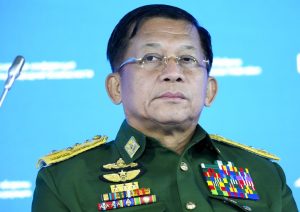Smarting at the deluge of negative coverage, Myanmar’s military government has officially warned the foreign press not to refer to it as a “junta” or to its seizure of power in February as a “coup d’etat.”
In a stentorian announcement published in the Global New Light of Myanmar yesterday, the Ministry of Information stated that the State Administration Council (SAC) formed the day after the coup “just controls various State duties in line with the provisions of the state of emergency” under the constitution. It stressed that the SAC is “not a coup d’etat government.”
“Some foreign news agencies were warned not to further apply the usage of military council/military junta/junta for the government in the future and not to quote and exaggerate the false news,” read the statement.
The ministry said “some foreign correspondents” based in Myanmar “exaggerate their news quoting rootless sources and false news related to Myanmar,” warned foreign media outlets and news agencies would face unspecified “action” if they “apply wrong usages, quote and exaggerate fake news, and disseminate false information.”
Since its takeover, Sen. Gen. Min Aung Hlaing and his junta have consistently claimed that they took power in strict accordance with the military-drafted 2008 constitution. In particular, alleging that rampant electoral fraud helped boost the National League for Democracy (NLD) to a lopsided victory at national elections in November.
In particular, they claim the coup was legal under Article 417 of the constitution, which grants the president the right to declare a state of emergency in “circumstances which may cause loss of sovereignty or disintegration of national solidarity.” These allegations have been dismissed by international observers, as well as the NLD-appointed Union Electoral Commission, while legal experts claim that the junta’s argument is flawed on several points.
The problem with the junta’s “request” that foreign journalists avoid using the word “junta” is that it’s hard for the international media to refer to it responsibly as anything else.
The Merriam-Webster dictionary defines “junta” as “a council or committee for political or governmental purposes,” especially “a group of persons controlling a government especially after a revolutionary seizure of power.” Even though the media (including this writer) tend to lean too heavily on the term, “junta” is a more or less accurate way of describing the clique that now claims to rule Myanmar.
The announcement lays bare the curiously bifurcated nature of the military government, which is aware enough to recognize the importance of international opinion to its fortunes, but cloistered enough not to realize how absurd its claims sound to many foreign ears.
Absurdities to one side, the junta’s warning is likely to spell further problems for the few foreign journalists remaining in Myanmar, as well as the local staff employed by news agencies. More than 80 media workers have been arrested since the coup, and the military authorities have shown few compunctions about including foreign citizens among their number. U.S. citizen Danny Fenster, the managing editor of Frontier Myanmar, remains in Insein Prison more than a month after his May 24 arrest at Yangon International Airport as he was preparing to board a flight to Malaysia.
Under the military junta that ruled Myanmar prior to 2011, absurdity was never far removed from menace. Yesterday’s warning carries more than a whiff of the old methods, and is a likely prelude to further forcible attempts to make reality conform to the junta’s distorted vision.

































